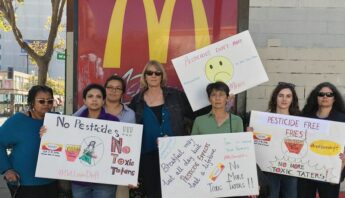Autism affects many, many more children than we thought, according to a study released this week that stunned experts around the world. Meanwhile, evidence keeps rolling in that exposure to pesticides and other chemicals is at least partly responsible for the epidemic.
We may have finally reached the tipping point, where policymakers can no longer wring their hands and call for more studies — and where wearing a blue ribbon in April to raise awareness is clearly just not enough.
I wholeheartedly agree with the mom featured in the recent — very powerful — PBS special Autism Now: "I couldn't be more sick of the word awareness. I think we've moved beyond the point where awareness is necessary. I think it's time we moved to action."
A roundup of this week's news clearly underscores that the time for action is now:
- The groundbreaking study out of South Korea found that 1 in every 38 children tested positive for some form of autism spectrum disorder (ASD), rather than the 1 in 110 estimated by the Centers for Disease Control;
- Researchers found that children conceived in March (peak pesticide spray season) are 16% more likely to be born with autism, according to medical records of 7 million California children; and
- Medical researchers estimate that in 2008, the overall annual costs of autism in the U.S. were more than $7.9 billion.
Pesticides and other toxins are certainly not solely responsible for the current autism epidemic (the term very carefully used by the staid Robert MacNeil in his Autism Now series). The scientists who are grappling with the complex disease are quick to point out that there is no single cause — and that "multifactoral causation" includes both genetic and environmental components.
Controlling what we can
But while we don't have much control over our genes, our exposure to pesticides is something we should be able to control. And evidence is stronger than ever that pesticide exposure, especially during fetal development and early childhood, not only increases risk of autism but can reduce children's IQ and increase rates of ADHD.
Buying organic is one small step parents can take. This not only reduces children's exposure from pesticide residues on food, it also supports the growth of green farming that in turn protects the health of children in rural areas.
As I've reported here before, concerned physicians are developing a "most wanted chemicals" list, calling for restriction or elimination of those toxins most clearly linked to ASD. We can check one chemical off this list with the recent global ban of endosulfan, a pesticide linked to higher rates of autism in California's central valley. This is an important victory, deserving serious celebration.
At the same time, we all know we won't win this battle one toxin at a time. Wholesale reform of the policies governing all toxic chemicals is long overdue.








